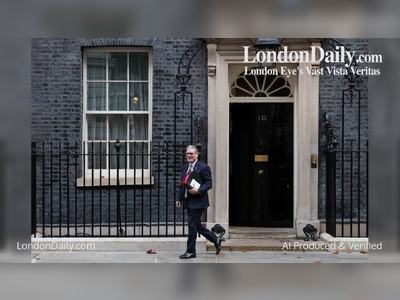UK Prime Minister Attempts to Reassert Authority Amid Internal Labour Leadership Drama
Downing Street contends with media briefings and market concerns as Prime Minister Starmer moves to reaffirm his leadership ahead of the November 26 budget
Prime Minister Keir Starmer faced a turbulent day in Parliament as he sought to reaffirm his leadership following a wave of media briefings suggesting he would resist any challenge to his role.
The briefings, attributed to unnamed allies, named Wes Streeting and Shabana Mahmood as potential successors and raised serious questions about internal stability within the Labour Party.
During Prime Minister’s Questions, Starmer told MPs that he “never authorised attacks on any member of my Cabinet” and described his team as a “united team” delivering for Britain.
His remarks followed reports of a Downing Street source suggesting that he would fight any leadership bid, a move that turned into a self-inflicted media storm.
Streeting, named in the speculation, strongly denied any leadership plotting, saying the narratives were “categorically untrue” and “self-defeating.” He reaffirmed his unwavering support for Starmer and dismissed suggestions that he would seek to replace the prime minister after the budget or local elections.
The turbulence reached financial markets, with UK government bond prices falling and the pound weakening, as investors signalled concern that internal instability could undermine Britain’s fiscal credibility.
Labour insiders warned that a leadership challenge now would be “reckless” and “dangerous,” especially ahead of the budget on November 26 and the next local elections.
Despite commanding a significant parliamentary majority from the 2024 election, Starmer’s public approval ratings have declined amid broken tax pledges, welfare-reform disquiet and the rise of the Reform UK party in the polls.
Under Labour’s rules, a leadership challenge would require backing from about 20 per cent of the party’s MPs—roughly 80 lawmakers—making any immediate bid unlikely.
Starmer’s allies positioned the episode as an attempt to shore up authority and warned rivals against internal manoeuvring that could distract from the government’s agenda.
At the same time, Labour back-benchers and mid-ranking ministers voiced unease about the direction of government and rallied behind calls for the leadership to focus on delivery rather than internal rivalries.
With the budget looming, Labour’s spotlight now turns to its economic plan, tax assumptions and whether the party can regain momentum and public trust without further internal fractures.
The briefings, attributed to unnamed allies, named Wes Streeting and Shabana Mahmood as potential successors and raised serious questions about internal stability within the Labour Party.
During Prime Minister’s Questions, Starmer told MPs that he “never authorised attacks on any member of my Cabinet” and described his team as a “united team” delivering for Britain.
His remarks followed reports of a Downing Street source suggesting that he would fight any leadership bid, a move that turned into a self-inflicted media storm.
Streeting, named in the speculation, strongly denied any leadership plotting, saying the narratives were “categorically untrue” and “self-defeating.” He reaffirmed his unwavering support for Starmer and dismissed suggestions that he would seek to replace the prime minister after the budget or local elections.
The turbulence reached financial markets, with UK government bond prices falling and the pound weakening, as investors signalled concern that internal instability could undermine Britain’s fiscal credibility.
Labour insiders warned that a leadership challenge now would be “reckless” and “dangerous,” especially ahead of the budget on November 26 and the next local elections.
Despite commanding a significant parliamentary majority from the 2024 election, Starmer’s public approval ratings have declined amid broken tax pledges, welfare-reform disquiet and the rise of the Reform UK party in the polls.
Under Labour’s rules, a leadership challenge would require backing from about 20 per cent of the party’s MPs—roughly 80 lawmakers—making any immediate bid unlikely.
Starmer’s allies positioned the episode as an attempt to shore up authority and warned rivals against internal manoeuvring that could distract from the government’s agenda.
At the same time, Labour back-benchers and mid-ranking ministers voiced unease about the direction of government and rallied behind calls for the leadership to focus on delivery rather than internal rivalries.
With the budget looming, Labour’s spotlight now turns to its economic plan, tax assumptions and whether the party can regain momentum and public trust without further internal fractures.










